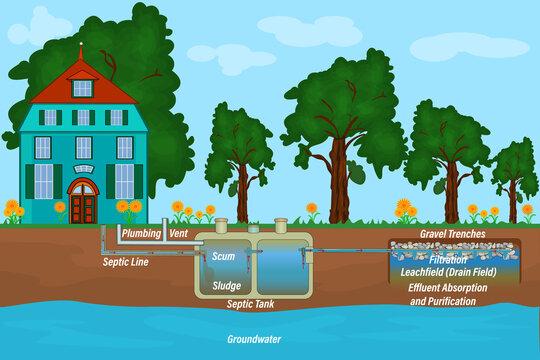The American dream, for many, involves owning a house, a safe haven where one can nurture their family, create lifelong memories, and leave behind a legacy. The excitement and thrill that comes with finding your perfect home can be overwhelming. But before you sign on the dotted line, there are some critical things you need to consider. If the house comes with a septic tank, you should pay particular attention. Here are ten things to check when buying a house with a septic tank.
1. Age of the Septic System
Septic systems can last between 15 to 40 years depending on their maintenance. Understanding the age of the system in your potential new home can help you predict any upcoming costs. You wouldn’t want to be surprised by a failing septic tank shortly after you’ve moved in.
2. Maintenance Records
Properly maintained septic tanks can outlast their expected lifespan. Ask the current homeowner for maintenance records. Regular maintenance activities should include pumping and inspection, among other routine checks.
3. Size and Capacity
Consider the size of your family and the amount of wastewater you’ll produce. You’ll need to ensure that the septic tank is the right size for your household’s needs.
4. Health of the Drain Field
The drain field is a critical part of the septic system where liquid from the tank goes for final treatment by the soil. Signs of a failing drain field can include a soggy yard, odor, or unusually vibrant vegetation.
5. System’s Design and Layout
You should know the design and layout of your septic system. Knowing where components are located will make your maintenance easier and prevent accidental damage.
6. Septic Inspection
A septic inspection is a must before you close the deal on the house. Hire a professional septic inspector to give you a detailed report on the current state of the system.
7. Local Septic Regulations
Each state has specific regulations regarding septic systems. Familiarize yourself with local requirements. You might find useful information, like certain upgrades are mandatory once a house is sold.
8. Backups and Previous Issues
Inquire about any past issues such as backups or overflows. If there were issues, investigate how they were resolved to ensure there will be no recurring problems.
9. Impact on the Environment
Septic systems can contribute positively to the environment if they are functioning correctly. However, they can also cause significant harm if they are failing. Check to see if the system is environmentally friendly. You might also consider using septic tank cleaning tablets like Septifix that are safe for the environment and help in maintaining the septic system’s health.
10. Proximity to Water Bodies
If the property is near a water body, make sure the septic system won’t pose a contamination risk. This can be detrimental to both the environment and the health of local residents.
This is just the tip of the iceberg. A properly functioning septic system is essential for a comfortable living environment. As part of your buying process, it’s wise to dive deeper into septic system care. The top 10 patents transforming the septic system industry can offer some insight into innovative technologies you might consider for your new home. You can also explore the 8 unexpected environmental challenges and how to overcome them, to understand better how a well-maintained septic system fits into the bigger picture of environmental responsibility.
Remember, buying a house is a significant investment. You want to make sure you’re making the right choice. Don’t let a failing septic system turn your dream home into a nightmare. With a little research and due diligence, you can ensure your new home will bring nothing but joy and comfort.
The Benefits of Septic Systems
Despite the potential for maintenance issues, there are numerous advantages to owning a home with a septic system. For one, it can be more cost-effective in the long run compared to being tied to a municipal sewer system, which often comes with recurring monthly charges. Additionally, septic systems are known for their durability when properly cared for, which means you may not need to replace it for several decades. And if you’re someone who values self-sufficiency, a septic system allows you to be in control of your own wastewater treatment.
Red Flags to Watch For
While conducting your inspection, there are some critical signs to look out for that might indicate a problem with the septic system. Persistent odors are a significant indicator that the septic tank may be full or not working correctly. Similarly, slow drainage in sinks and toilets may point to issues with the septic system. Backups, gurgling sounds, and patches of very green grass over the drain field are all red flags. Should you observe any of these signs, you should have a professional conduct a more thorough examination of the system before you proceed with the purchase.
Preventive Measures for Septic System Maintenance
It’s crucial to treat your septic system with care to prolong its lifespan and avoid costly repairs. Regular inspections and pumping are necessary to keep the system running efficiently. Moreover, avoid flushing anything other than toilet paper and organic waste. Household products such as oils, grease, chemicals, coffee grounds, and hygiene products can cause blockages. In the kitchen, consider installing a grease trap to prevent fats from entering the system. Similarly, a lint filter on your washing machine can keep harmful synthetic fibers out of your tank.

